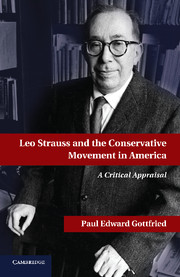7 - Conclusion
Published online by Cambridge University Press: 05 January 2012
Summary
In an interview with Le Monde (April 16, 2003), director at l’Ecole des Hautes Etudes, Pierre Manent states that prominent Straussians went into government service under George W. Bush because they had been “ostracized in the academic profession.” Presumably Straussian policy advisors embraced government posts out of professional desperation, according to Manent, a one-time student of Raymond Aron, whom his mentor sent to Chicago to study under that “brilliant” critic of modernity, Leo Strauss. Peter Minowitz repeats the same complaint in Straussophobia, when he describes the disciples of Strauss as a “tiny minority” in the American academy. Having been subjected to “anger and prejudice” and having seen that “Straussians of all stripes confront layers of acute suspicion,” Minowitz’s subjects are forced to live as outcasts. To whatever extent they remain professionally employed, it would seem they are hanging on by their fingertips, perhaps at community colleges in rural North Dakota.
Apropos of this characterization, John Gunnell observes: “This picture is hard to square with the status of Straussians in many major university departments and their prevalence in many colleges. Although it is possible to find instances in which Straussians have arguably been discriminated against because of their scholarly stance, political science journals and professional meetings have treated their work as commensal.” A one-time leader of the political science profession, Gunnell has furnished a generally dispassionate account of the Straussians’ presence in American higher education: He points out their reach in academic institutions, from the University of Chicago Committee on Social Thought through political theory departments at elite universities to often prestigious smaller colleges spread across North America.
- Type
- Chapter
- Information
- Leo Strauss and the Conservative Movement in America , pp. 149 - 164Publisher: Cambridge University PressPrint publication year: 2011



